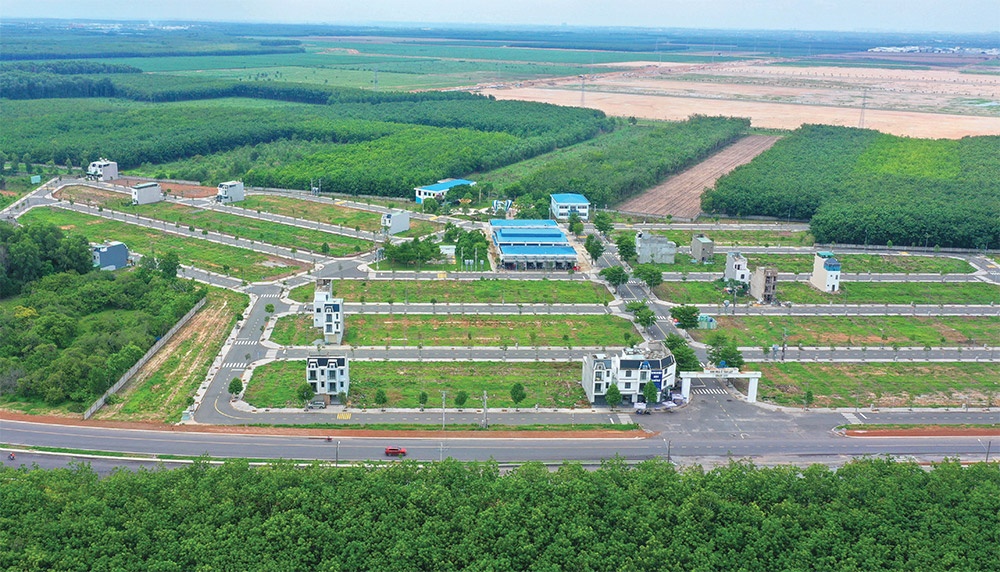Pilot set to help streamline commercial land expansion
 |
| Barriers for businesses without approved residential land could be removed soon, photo Le Toan |
Last week, Minister of Natural Resources and Environment Do Duc Duy presented a draft resolution to the National Assembly (NA), proposing expanded land use rights for commercial housing projects on non-residential land.
“Under the Housing Law, since 2015, developers could only build commercial housing projects if their land plots included a portion designated for residential development. This regulation has significantly restricted the implementation of projects in areas lacking designated residential land, particularly in new urban zones,” Duy said.
He noted that individuals and households are limited to using a maximum of 400 square metres of their land plots for residential purposes, with the remainder classified as agricultural land.
Consequently, developers often face challenges in acquiring land use rights for residential purposes in commercial housing projects. Most real estate projects rely on land initially designated for other purposes, such as traffic use or green space.
“To address these obstacles and boost the real estate market’s land supply, the government proposes allowing investors to acquire use rights for agricultural land, non-agricultural land, and other land types for commercial housing projects. If approved, this policy will be piloted for five years, starting from January,” Duy said.
According to Le Hoang Chau, chairman of the Ho Chi Minh City Real Estate Association, the real estate sector in Vietnam is optimistic about the resolution’s potential approval by the 15th NA.
“This resolution will enable investors and businesses to access non-residential land through voluntary agreements, paving the way for commercial housing projects. Such agreements between individuals and businesses can reduce disputes and lawsuits, complementing existing methods like land auctions or competitive bidding for land-use projects,” Chau said.
He added that the resolution could also help increase the supply of housing projects, contributing to lower housing prices.
Nguyen Hoang, a consultant based in the southern province of Dong Nai, told VIR that under the current approach, the Land Law 2024 prevents businesses without residential land from being approved as investors, even if their projects align with urban planning and land-use plans.
“This barrier has hindered businesses in developing commercial housing projects. The proposed resolution will remove these roadblocks, encouraging investment and development,” Hoang said.
Reports from local authorities reveal that nearly 580 commercial housing projects nationwide have been implemented under the current agreement mechanism. Of these, almost 500 projects face hurdles related to residential land requirements.
The NA is expected to consider and approve the resolution at the end of its eighth session, scheduled for November 30.
 | Land law overhaul transforms land acquisition Senior partner Duyen Ha Vo and senior associate Tram Dang of VILAF explore the potential implications of upcoming changes on land acquisitions of developers engaged in real estate, energy, and infrastructure projects. |
What the stars mean:
★ Poor ★ ★ Promising ★★★ Good ★★★★ Very good ★★★★★ Exceptional
Related Contents
Latest News
More News
- Construction firms poised for growth on public investment and capital market support (February 11, 2026 | 11:38)
- Mitsubishi acquires Thuan An 1 residential development from PDR (February 09, 2026 | 08:00)
- Frasers Property and GELEX Infrastructure propose new joint venture (February 07, 2026 | 15:00)
- Sun Group led consortium selected as investor for new urban area (February 06, 2026 | 15:20)
- Vietnam breaks into Top 10 countries and regions for LEED outside the US (February 05, 2026 | 17:56)
- Fairmont opens first Vietnam property in Hanoi (February 04, 2026 | 16:09)
- Real estate investment trusts pivotal for long-term success (February 02, 2026 | 11:09)
- Dong Nai experiences shifting expectations and new industrial cycle (January 28, 2026 | 09:00)
- An Phat 5 Industrial Park targets ESG-driven investors in Hai Phong (January 26, 2026 | 08:30)
- Decree opens incentives for green urban development (January 24, 2026 | 11:18)

 Tag:
Tag:





















 Mobile Version
Mobile Version